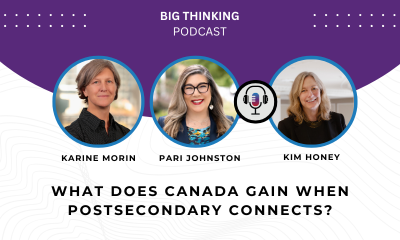Sociology researcher Jenny Li among leading line-up of speakers at Congress 2022, Canada’s largest humanities and social sciences conference, taking place virtually May 12-20
Antigonish, Nova Scotia, ON, May 11, 2022 – Canadians aged 12 to 25 are more likely to experience mental illness and/or substance use disorders than any other age group and yet, less than 20 per cent are receiving appropriate treatment. Why? Because we simply aren’t doing a good job of listening to them.
That’s one of the primary findings of researcher and youth mental health advocate Jenny Li, a recent Honours in Sociology graduate from St. Francis Xavier University, who is on a mission to improve youth mental health service delivery in Canada through adoption of Integrated Youth Services (IYS) hubs — an emerging model for providing more effective, youth-focused, wraparound mental health care.
Li will be sharing this message as a featured speaker at the upcoming Congress of the Humanities and Social Sciences (Congress 2022), Canada’s largest academic gathering and one of the most comprehensive in the world, taking place virtually this year from May 12-20.
Billed as a leading conference on the critical conversations of our time, Congress 2022 serves as a platform for the unveiling of thousands of research papers and presentations from social sciences and humanities experts worldwide. With more than 6,000 visitors expected to log in, the event focuses on reimagining the future following two years of the COVID-19 pandemic and other life-altering world events, with the goal of inspiring ideas, dialogue and action that create a more diverse, sustainable, democratic and just future.
“Young people receiving mental health services need their voices to be heard,” said Li. “The problem, though, is that traditional mental health systems are complicated to navigate, unwelcoming and have long wait times, leaving youth prone to falling through the cracks,” Li said. On top of that, users of the youth and adolescent mental health system must transfer to the adult mental health system as soon as they are considered adult, a bureaucratic measure that isn’t necessarily in their best interest.
“In most provinces, if a young person enters the mental health system at 16 or 17, they have to leave when they turn 18, a shift that’s less tailored to what is best for them and more to do with regulations,” Li explained. “The IYS model does away with all of that and really tries to ensure that young people are at the centre of their own mental health journey.”
IYS hubs— already widely used in countries such as Ireland and Australia, but just now taking off in Canada — operate like one-stop community centres, welcome to all youth aged 12 to 25 as a place to access services, from financial security advice to academic tutoring to more mainstream mental health support, such as psychiatry or addictions counselling. ACCESS Open Minds, for example, is one of the more mature IYS hubs in Canada, providing culturally relevant mental health services as well as access to physical and sexual health support, traditional Indigenous programming and other social services under one roof.
Li’s qualitative study, co-authored by St. Francis Xavier Associate Professor of Sociology Dr. Katie Aubrecht, included interviews with IYS users and administrators. What they found is the most successful hubs are applying a co-creation model where youth are treated as partners in the consultation process, working alongside administrative directors, executive teams and health professionals to map out what service delivery should look like. For example, youth said it was important to be given a space where their identities are celebrated, where they feel safe and where they can learn from other lived experiences that may be similar to theirs.
Li’s mission to grow Canada’s IYS hub network is a personal one. After struggling with mental health issues starting at age five, when Li’s family immigrated to Calgary from China, Li decided to do something about it. In 2018, Li founded the Free Your Mind Mental Health Society, a youth-led not-for-profit, and over the past two years, helped to develop and launch Kickstand, a brand new IYS serving youth in Alberta.
“When I arrived in Canada, I didn’t speak a lick of English, nor French. I was in a completely different environment with a different culture and surrounded by people who didn’t look like me,” Li said, who was abused by grandparents, bullied at school and sexually harassed at junior high.
“At my lowest point, I contemplated suicide on a daily basis and though I tried to reach out for help, I didn’t know how and resources were limited,” Li added. “I know there are other people like me who are really struggling and I want to do everything I can to make sure their voices are heard.”
Dr. Aubrecht explained that “we’re still in a paternalistic relationship when it comes to progressive directions in service provision, and we need to start changing how we think about people with lived experience and recognize them as leaders – I don’t think there’s any better example than Jenny.”
Organized by the Federation for the Humanities and Social Sciences, Congress 2022 is sponsored by the Social Sciences and Humanities Research Council of Canada, Mitacs, SAGE Publishing, Universities Canada, the Canada Foundation for Innovation, and University Affairs.
Registration – which includes 100+ keynote and open Congress 2022 sessions (with recordings available until June 3, 2022) – is $55. Visit www.congress2022.ca to register for a community pass and access the program of events open to the public. Use coupon code TRANSITIONS2022 for 10% off registration.
###
For more information:
GBPR
Tel: (877) 986-1340
Email: info@gailbergmanpr.com

What does Canada gain when postsecondary connects?
← Big Thinking Podcast homepage Introduction | About the guests | Transcript | Follow us Introduction Canada’s future is being written in the places where people learn and in how those places connect. If collaboration holds the key to shaping that...

Canada's AI leadership calls for all expertise at the table
After bringing together humanities and social sciences AI experts for a consultation with the federal government’s AI Strategy Task Force on October 20, the Federation submitted the following on October 31. Written submission to the AI Task Force...

Building a strong research future with Budget 2025
On November 4, 2025, the federal government tabled its 2025 Budget: Canada Strong. Through its investment to attract international talent, this Budget recognizes the vitally important work of researchers. Notably, Budget 2025 commits $1 billion over...
